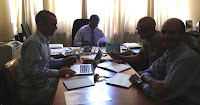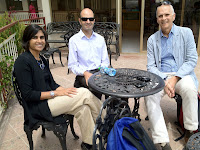It seems difficult to believe that it’s December and
Christmas is right around the corner.
 |
| Holiday Concert at School (Aysha on percussion) |
To celebrate the end of the year the kids have a crazily
long Dec/Jan break (3 weeks plus two days).
Various holidays get absorbed around this time: Ethiopian Orthodox Xmas
(Gena) ,Epiphany (Timkat), Milaud,
Christian Xmas, New Years .
I’m having a hard time imagining myself madly shopping,
wrapping, treeing, baking etc (I know that’s not what Christmas is about, but
that’s how I usually celebrate.). None
of that type of stuff going on here.
Ethiopian Christmas (Gena) is celebrated on January 7th and is a more sober
affair with an absence of trees, Santas and gifts. Strangely, I’m not missing the holiday
scramble but will probably make up for it next year with some sort of Christmas
over indulgence.
The month has been good.
 |
| Sue and Erle in Tigray |
We had a terrific
visit from Sue and Erle earlier this month.
After much debate on Sue’s part as to whether to come or not; I think
Sue might have had fun and we even heard her say some good things about
Ethiopian Airlines!
Aysha turned 14 this month (another unbelievable
thing). We had a lovely birthday dinner
with some of her girlfriends from school.
 |
| Y12, "our" hospital |
 |
| Rounding with Med Students |
We also decided on a “launch” date for our Family Medicine Residency
program: January 28th is D-day.
Seems like there is still an overwhelming amount of organizing that
needs to be done, but we are happy that things are moving forward. Hope there won’t be too much shrapnel to clean
up after the launch.
Happy Holiday’s from all of us to all of you!
 |
| Sunil and his buddies after school |
 |
| Season 1 Sports Awards |


































